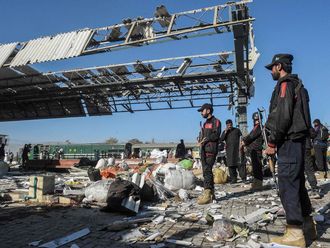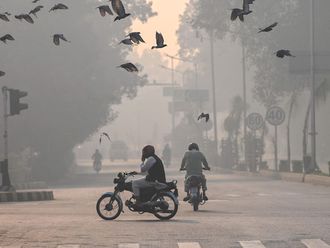Islamabad: Eighty-eight seminaries belonging to various sects are imparting religious education to more than 16,000 students in the federal capital.
A research carried out by the private Bureau of Investigation shows that the number of students of the Deobandi seminaries, including the Jamia Hafsa and the Jamia Faridia, doubled during the last one year.
The figures have been collected from government agencies, which would not like to be named because of the sensitivity of the issue. In 2005-06, 5,039 religious students from Islamabad's Deobandi seminaries took exams conducted by Wafaqul Madaris Al Arabia (WMA), the central examination board of the Deobandi sect.
About 3,000 of them were from the Jamia Hafsa, the madrassa for women attached to Lal Masjid, and Jamia Faridia, that for men associated with that masjid.
But today these two seminaries hold 10,700 students, showing a 100 per cent increase in their number in just one year. The reason for this big surge in the number of students is still not known to the government. A comparative research based on the figures available with the Bureau of Investigation about the number of students who appeared in the 2005-06 exams holds more surprises.
A total of 5,093 students (male and female) appeared in different seminary examinations in Islamabad. Of them, 4,653 students appeared in examinations for degrees equivalent to matriculation, intermediate, graduation and post-graduation.
The rest of them were for Hifz-e-Qur'aan only.
The present number of 10,700 seminary students in the "modern and progressive" federal capital is almost equal to the combined strength of the seminary students from Balochistan (6,374) and Azad Jammu and Kashmir (2,835). Moreover, the total number of students from the Jamia Hafsa and the Jamia Faridia (5,000) falls short of total seminary students of Balochistan by only 1,335 students.
A comparison with seminaries of other sects shows that the number of students, who have been studying in the Jamia Hafsa and the Jamia Faridia (Deobandi) is, again, equal to the total number of students (5,400 students), studying in all the 74 seminaries, belonging to all the other sects; Barelvi (3,000 students in 46 seminaries), Ahle-Hadith (200 students in two seminaries), Shia (700 students in eight seminaries) and Jamaat-e-Islami-led Rabitaul Madaris (1,500 students in 18 seminaries) in Islamabad.
The Jamia Hafsa has the highest number of teachers: 158, a strength matching that of the big institution imparting liberal education. The research also shows that Deobandi seminaries grew at a much faster pace in the federal capital during the period of elected governments.












